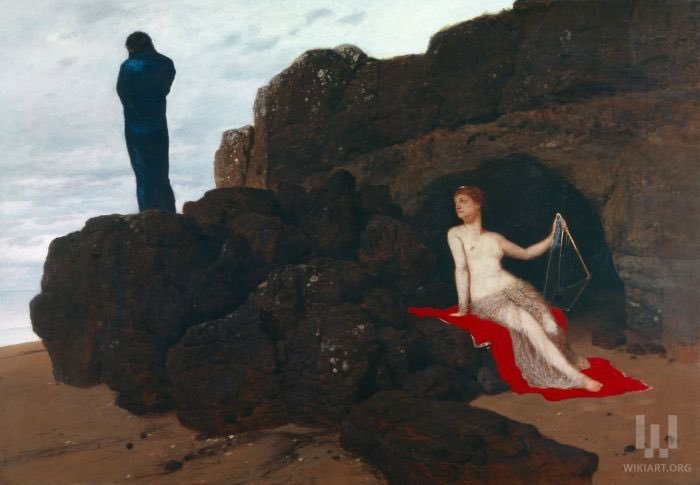CALYPSO SETS ODYSSEUS FREE
“Odysseus shall return and pay the traitors back. Telemachus? Sail him home with all your skill.”
Art: Odysseus and Calypso, by Arnold Böcklin (1882)
So speaks Zeus at the council of the gods that opens Book 5. The message is clear: while we’re about to meet Odysseus and hear more of his stories and journey, the end-game is set in motion. This is the anti-Oresteia. Odysseus and Telemachus both will sail home, and they will not be ambushed. Rather, they will defeat the suitors. Hermes arrives to announce to Calypso that Zeus has sent him to her with explicit instructions to release Odysseus. The time has come. She resists but has no choice to obey, and sets out to find Odysseus. That’s when we first meet him. Not as the great warrior, not as the great teller of tales, but sitting on a rock overlooking the ocean, weeping for his family and home. Broken. Diminished. This is what war does — and it’s also what happens when a goddess (or god) dehumanizes a mortal and makes them her prisoner and, essentially, courtesan. Is it any surprise that Odysseus doesn’t trust the gods? We see that distrust at work after he builds his raft and sets sail, free at last. Poseidon is displeased: “Outrageous! Look how the gods have changed their minds about Odysseus. […] Still my hopes ride high — I’ll give that man his swamping fill of trouble!” He sends forth a great storm and the nymph Ino attempts to help Odysseus, but he doesn’t trust her. Although he refuses to heed her instruction, he does hang on to her magical red scarf, hedging his bets. What we see her is the portrayal in action of a man who has learned to live between the (oftentimes fickle and false) promises of immortal beings, and his own cunning and guile. At the end of the book, we leave him brought as low as possible. Bedding down beneath two olive trees and covering himself with dead leaves. But much like a plant rising from the soil after winter, the image suggests that he will spring back to a new life come morning. And of course the olive tree is the symbol of goddess’s victory over god Poseidon in their competition about who will win the city of Athens as a place of worship… so it serves here both of a reminder of the only goddess Odysseus trusts, and of the favor she bestows on him, still, as this new adventure begins.
-
Read the Odyssey online in the translation by Robert Fagles, or order the paperback.
Learn about the longstanding rivalry between Athena and Poseidon, who compete for the naming of the city of Athens.
